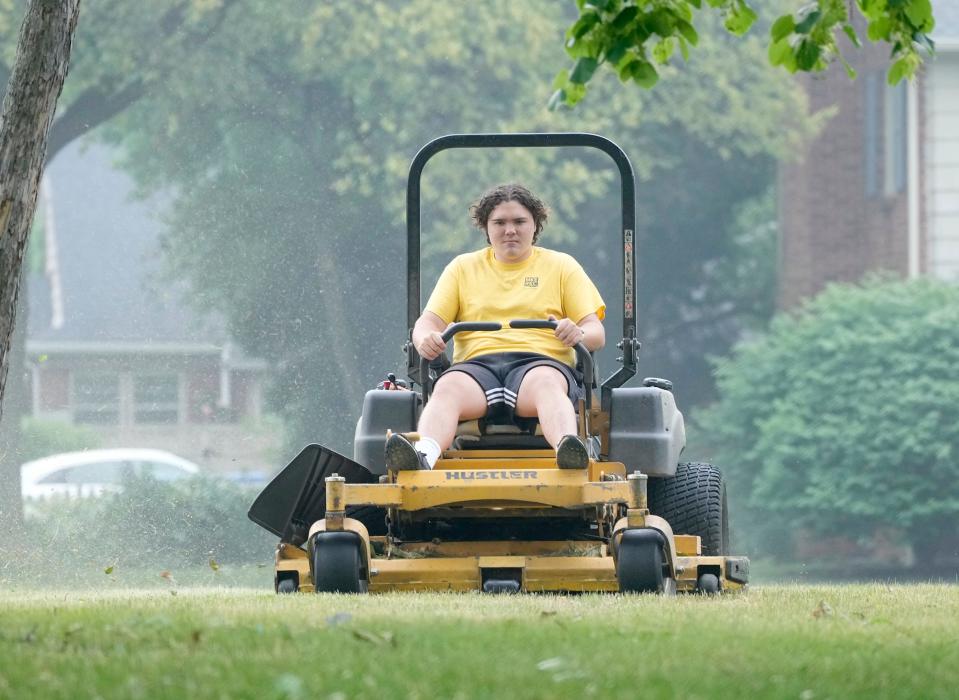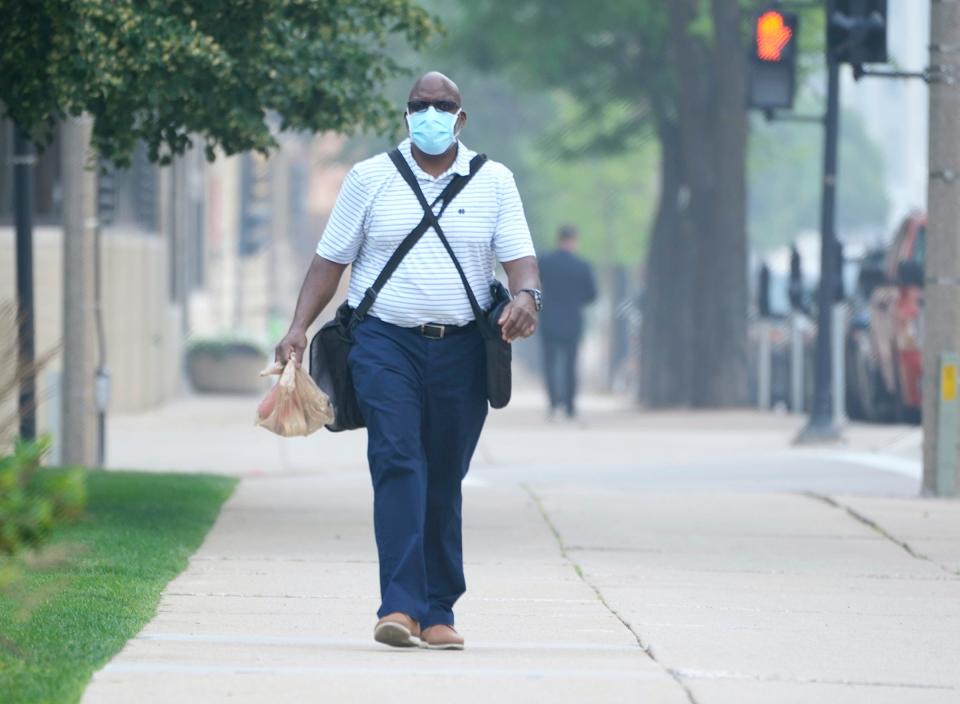Can I walk my dog? Does AC really help? Is my mom OK? A host of tips for dealing with our bad air.
The wildfire smoke blanketing the Milwaukee area has hit such high levels that the air outside is unhealthy for anyone to breathe.
Even as conditions slowly improve through Wednesday and into Thursday, you should take steps to avoid potential short and long-term impacts that can come from breathing in the smoke and other pollution particles. The two things to control are: the amount of pollution particles you breathe in, and how long you're breathing them.
Here are some concrete steps you can take to stay safe.
These tips were complied based on interviews with three Wisconsin health experts: Nick Tomaro, emergency preparedness environmental health director at the Milwaukee Health Department; Ben Weston, the chief health policy advisor for Milwaukee County and an associate professor of emergency medicine at the Medical College of Wisconsin; and Eric Schauberger, pediatric allergist and immunologist at UW Health.
More: How is air quality measured? What are we inhaling? Here's the science behind the smoky haze.
Skip your outdoor run or long walk with the dog
It may be part of your daily routine, but anything you can do to avoid being outdoors for long periods of time is worth it.
That means skipping long, strenuous outdoor activities like workouts, walks, kids' softball games, mowing the lawn and more.
Poor air quality has such a clear health impact that it will lessen any gains from your outdoor exercise anyway. Though the comparison isn't perfect, some have tried to convert the hours spent outdoors in the smoky air to smoking a number of cigarettes in an effort to explain how it harms the body.
"By staying inside, maybe you're not going to get that really good, long-distance workout that you would outside, but you're keeping your lungs clean," Weston said. "You're breathing in clean air, and you're still getting some exercise."
Best bet is to just work out at home or at an indoor gym until conditions improve, Weston said.
More: Wisconsin shatters record for worst air quality since the creation of Air Quality Index
Shut your windows and circulate air inside — maybe even build your own air filter
While driving in your car or sitting in your home, make sure windows are shut and you are circulating air internally. In a car, you can close your air vents and put the air on recirculate.
You can use a portable air filter to clean air, or run central air conditioning in your home on recirculation mode as well. Many modern ACs have filters built in, but if you're unsure you can also run a ceiling or room fan to get air moving without turning on the AC.
For about $70 and a trip to a general store, you can even build your own air filter called a Corsi box, Weston notes, using a box fan and four MERV 13 filters. The project can be an easy science activity for kids while they're stuck at home.
Built a Corsi Box!
☑️Box Fan: $21.99
☑️MERV 13 Filter 4 pk: $39.96
☑️Duct Tape: $6.99
✅Filtering COVID virus like crazy: PRICELESS😁
To keep schools functioning, for $70 and 20 mins of time, these should be in every classroom. #corsirosenthalbox @CleanAirCrewOrg @CorsIAQ pic.twitter.com/XnebdoIS1Y— Ben Weston MD MPH 😷 💉 (@BenWWeston) December 30, 2021
Make a day of it by visiting a museum, library, or other public place
The next day or so will be a good time for indoor activities for kids and families.
The city health department has a list of indoor public spaces on its website where people can go to get out of the smoke. From going to the movies or a mall to hanging out at the library or a museum, any time spent out of the smoky air while having some fun can help protect your health, Tomaro said.
Download an air quality measurement app to inform your decisions and track conditions
To track conditions in real time, you can download the AirNow app or visit the website, run by the U.S. Environmental Protection Agency.
Even when the weather starts to look like it's clearing up, air quality can still be poor, Tomaro noted, and conditions can change as quickly as the wind. He said there will probably be other bad air days this summer as wildfire season continues.
"I think we're going to be dealing with this for quite a while, and I just worry that on certain days when it looks better, people are going to let their guard down," Tomaro said.
Can I go to the store or do other daily tasks that require being outdoors? Should I wear a mask?
For generally healthy people, it can be OK to go to the grocery store, attend doctors appointments and run quick errands.
Wearing a high-quality mask while doing so is recommended. As is limiting the time you're outside.
"It's a combination of time and how bad (the air quality) is," Schauberger said of the health impact of air pollution.

N-95 masks can filter out the air pollutants that are of main concern in this situation: PM2.5 particles. These particles are bigger than the virus that causes COVID-19, so the masks can keep them out just like they would COVID.
But the fit of your mask is essential to protecting you, especially given that all of the air around you is polluted, rather than COVID spreading through the air around an infected person. And even the best mask can fail to protect you if it's not properly fitted and covering your nose and mouth area.
It's important not to become complacent just because you're masked. Use them for a run to the grocery store, but maybe postpone the masked round of golf until conditions have improved, Schauberger said.
Tips for more minor irritations: eye drops and fresh clothes
Saline drops can help flush out irritated eyes, and a high quality mask can keep pollutants out of your airways.
Schauberger also recommended changing your clothes when you get home, to get any smoke settled in them off your body.
Check in on kids, the elderly and those with health conditions
There are several groups of vulnerable people who are at risk beyond irritated eyes and a cough.
For people who have underlying health issues, like COPD, asthma, lung disease, and even heart disease, air pollution can lead to exacerbated health issues. Those who have asthma, even if it's mild, should make sure to take medications and make sure their inhalers are up-to-date.

People with heart and other conditions should also take precautions, such as avoiding overexertion that can force the heart to work harder and increase the risk of a heart attack or stroke.
Kids are at higher risk too, because they have smaller airways that can get irritated more easily. And they are not always able to articulate that they are having a hard time breathing, Schauberger said. In general, but especially if your child has asthma or another health condition, you should look for signs of life-threatening breathing issues.
That includes: coughing and wheezing, rapid breathing, and in young children, belly breathing, which is when kids are using their abdominal muscles to breathe or are sucking in their tummy under their ribs. If parents notice these signs they should seek medical help right away.
Contact Devi Shastri at 414-224-2193 or DAShastri@jrn.com. Follow her on Twitter at @DeviShastri.
This article originally appeared on Milwaukee Journal Sentinel: Fires in Canada continue to ruin air in Wisconsin. Here's what to do.

